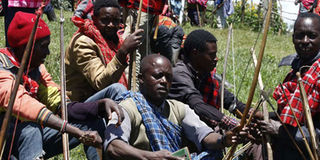Maasai, Kipsigis enter peace deal to end clashes in Narok

Members of the Maasai community attend a peace meeting led by Narok County Commissioner George Natembeya at Olengape in Narok North on September 24, 2018. PHOTO | AYUB MUIYURO | NATION MEDIA GROUP
What you need to know:
- Commissioner Natembeya held several meetings with elders from the two sides at Ololoipangi and Nkoben.
- They agreed to end the issuing of remarks that could spark violence and to let police thoroughly investigate the attacks and prosecute the perpetrators.
- County Commissioner George Natembeya said the dusk to dawn curfew he imposed in affected areas will remain until peace returns.
- He announced plans for the construction of General Service Unit camps at Oloipangi, Nkoben and Teekat.
The Maasai and Kipsigis communities have reached a peace deal following the clashes that claimed seven lives in the last three months and left hundreds displaced in Narok South.
Representatives from the two communities on Saturday agreed to bury the hatchet, at a meeting that County Commissioner George Natembeya attended.
RESOLUTIONS
Commissioner Natembeya held several meetings with elders from the two sides at Ololoipangi and Nkoben.
They agreed to end the issuing of remarks that could spark violence.
The communities also resolved to let police thoroughly investigate the attacks and prosecute the perpetrators.
DEVELOPMENT
Mr Natembeya noted that the fighting has derailed development and caused the area to suffer huge social, economic and political losses.
“While President Uhuru Kenyatta spearheads the Big Four agenda, we are busy burning houses and killing each other,” he said.
To prevent injuries and deaths, the commissioner banned residents from carrying crude weapons including bows and arrows to public spaces.
He said the dusk to dawn curfew he imposed in affected areas will remain until peace returns.
GSU CAMPS
Mr Natembeya announced plans for the construction of General Service Unit camps at Oloipangi, Nkoben and Teekat.
This, he noted, will help prevent cases of violence, such as the one two weeks ago, when two people were killed, at least 15 injured and more than 40 houses torched.
The clashes in Oloruasi and Nkoben villages were reportedly triggered by the theft of a cow from Ololoipang’i.
In September, the volatile area witnessed week-long ethnic clashes that left at least four people dead, scores injured and over 50 houses burned.
The flare-ups spread to Olposimoru along the border of Nakuru and Narok counties, where one person was killed and 32 injured.





